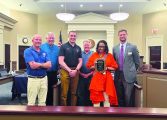By Heather Michon
Correspondent
Over objections of a vocal group of citizens, the James River Water Authority (JRWA) unanimously approved a motion to move forward with an application to the Army Corps of Engineers to construct a water pumping station atop a site the Monacan Indian Nation believes to be the remains of their historic capital of Rassawek.
Nearly 100 people assembled in a meeting room at Spring Creek in Zion Crossroads for the meeting on Wednesday (March 11), with about 50 people speaking out against the plan during public comments.
The James River Water Project is designed to pump millions of gallons of water out of the James River in Fluvanna and carry it into the Zion Crossroads area. This multimillion-dollar project had run into multiple roadblocks over the past year, with state and federal departments denying needed permits after a survey conducted at the site were found to be performed by an archaeologist without proper credentials, and serious charges that the survey itself was badly mismanaged.
At their February meeting, consultants presented more than a dozen alternate locations for the pumping station, but maintained that the current location, near the confluence of the Rivanna and James Rivers near Columbia, was the best site from both the financial and engineering perspectives.
Among the first to speak during the public comment period was Kenneth Branham, chief of the Monacan Indian Nation.
Chief Branham expressed outrage over rumors that that tribe was using the issue to get money for the reburial of any remains found at the site, a claim he called “the biggest lie that I have ever heard, and it is so disrespectful. We will not take any amount of money to let you go through there and destroy our ancestors’ homeland.” Instead, the tribe had proposed four alternate locations for the pumping station. “We’re doing your job for you.”
In the days leading up to the meeting, the tribe’s legal representatives, Cultural Heritage Partners, wrote a letter to the JRWA asking them to consider what they call the “Forsyth Alternative,” a piece of land about a mile up the James from the current site. The owners of the property had signaled a willingness to work with the authority as a potential site for the pump. Branham urged them to consider it.
“You’ve taken our land, you’ve taken our religion, you’ve taken our language, and it’s time to stop,” he concluded.
Jeffrey Hantman, professor emeritus of anthropology at the University of Virginia, scoffed at the idea that it was only “speculation” that construction at the site would disturb centuries-old burials.
“We don’t speculate,” he said. “We look at patterns, and the patterns are clear: Monacan burials are associated with chiefs’ villages. They are commonly found in villages and towns along the river. It’s a known pattern, it’s been published, and it should be reflected in your writing.”
Speaker after speaker denounced the project for potentially destroying what several termed a “national treasure.”
“If you push through with this, you’re running a risk of costing the taxpayers extensive court costs, long delays, and the likelihood that you will still have to pay the extra money you’re claiming you would need for the alternate site,” said Kate Ferguson.
She argued that the site could better be utilized as a tourism site focused on indigenous culture. “It’s one of the sources of wealth and growth that doesn’t actually poison the water.”
Justin Curtis, an attorney consulting the authority, argued that submitting the application to the Army Corps of Engineers based on the Point of Fork site “is not the end of the process or the final decision, it is one of the preliminary steps along the way.”
“And my suggestion and recommendation is there’s no reason to defer that step at this point,” he argued. “That doesn’t prejudice our ability to continue discussions with the Monacan Nation or anyone else, but it does advance the ball on this permit application.”
As members began to vote to approve the motion to submit the application, many audience members stood and turned their backs.
When the motion passed unanimously, they began to chant “Shame!”




